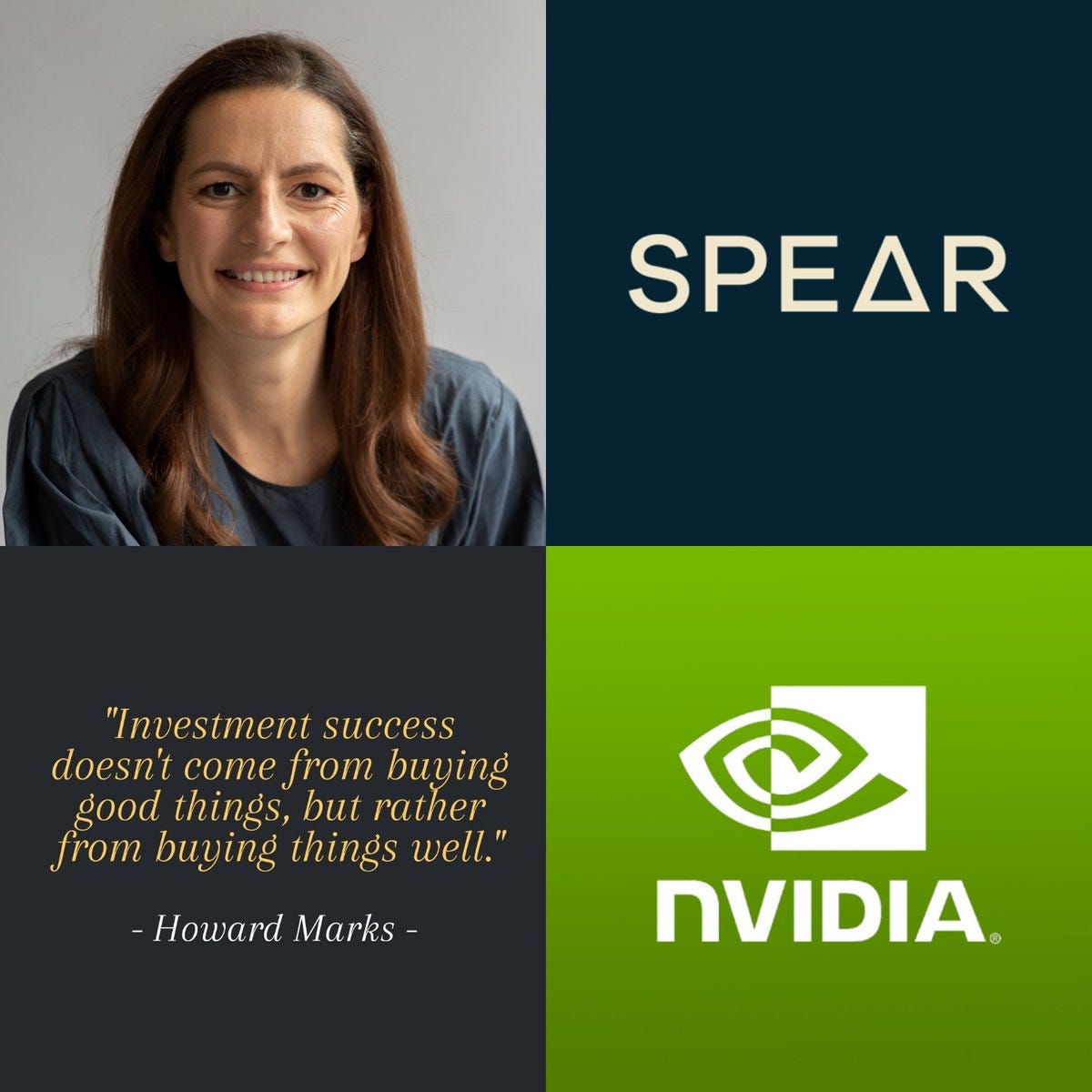Welcome to Investor Talk — where we interview successful investors to uncover their journeys, strategies, and the lessons they've learned. Get inspired by real stories and gain valuable insights to sharpen your own investment approach.
Every interview follows the same set of sharp, insightful questions — such as “What is your investment strategy?”, “What are your highest conviction stocks?”, and “What’s the biggest investment mistake you’ve made?”
In this edition, we have the pleasure of interviewing:
Name: Ivana Delevska @IvanaSpear
Age: 41
Residence/Country: New York, USA
Invests since: 2008
𝗜𝗻𝘁𝗿𝗼𝗱𝘂𝗰𝘁𝗶𝗼𝗻
After graduating from college, I joined the M&A group at JP Morgan. Banks provide unique opportunities to get hands-on exposure and solid training programs. Shortly after my analyst program, I joined a large hedge fund. I can't say that I knew a lot about investing and public markets at the time, but I built a strong foundation for valuing and assessing companies, public or private, in my banking program. While on the buy side, I worked for several top-tier hedge funds, such as Citadel, Millenium, and Tiger Cub, doing long/short fundamental equity investing. Each experience contributed differently to building out my investment style. For example, Tiger Cubs are known for high-conviction research and longer-term ideas; Citadel was a great place to learn about risk management and how to measure alpha. I started Spear 3 years ago with the idea that I could bring the same rigor that hedge funds use to the everyday investor. My investing style today builds on the years of prior experience and best practices from all the funds I previously worked for.
𝗪𝗵𝗮𝘁 𝗶𝘀 𝘆𝗼𝘂𝗿 𝗶𝗻𝘃𝗲𝘀𝘁𝗺𝗲𝗻𝘁 𝘀𝘁𝗿𝗮𝘁𝗲𝗴𝘆?
My background is in fundamental research and investing. I cover a universe of about 120 companies that I speak to on an ongoing basis.
I focus on understanding entire value chains and identifying where the biggest changes and inflection points are. I narrow down the research to 5-6 focus areas. With this approach, I can identify opportunities before they become mainstream. One of the key differences between Spear and our competitors is our risk management strategy. We have a very rigorous approach to identifying a thesis and tracking if the thesis is playing out.
𝗛𝗼𝘄 𝗺𝗮𝗻𝘆 𝘀𝘁𝗼𝗰𝗸𝘀 𝗮𝗿𝗲 𝗰𝘂𝗿𝗿𝗲𝗻𝘁𝗹𝘆 𝗵𝗲𝗹𝗱 𝗶𝗻 𝘆𝗼𝘂𝗿 𝗽𝗼𝗿𝘁𝗳𝗼𝗹𝗶𝗼?
20-25 at any given time. The reason for the concentration is that, in my experience, the alpha generation drops off after a set number of investments; the more stocks you add, the more the returns start looking like a passive index.
𝗪𝗵𝗶𝗰𝗵 𝘀𝗲𝗰𝘁𝗼𝗿𝘀 𝗱𝗼 𝘆𝗼𝘂 𝗺𝗮𝗶𝗻𝗹𝘆 𝗳𝗼𝗰𝘂𝘀 𝗼𝗻?
I focus on B2B technology. The last technology cycle was dominated by consumer tech companies. The next one could be technology transforming every industry, which could be a lot more powerful.
𝗪𝗵𝗮𝘁 𝗮𝗿𝗲 𝘆𝗼𝘂𝗿 𝗵𝗶𝗴𝗵𝗲𝘀𝘁 𝗰𝗼𝗻𝘃𝗶𝗰𝘁𝗶𝗼𝗻 𝘀𝘁𝗼𝗰𝗸𝘀?
$NVDA - Nvidia
$ZS - Zscaler
$MRVL - Marvell Technology
𝗪𝗵𝗶𝗰𝗵 𝘀𝘁𝗼𝗰𝗸 𝗵𝗮𝘀 𝘁𝗵𝗲 𝗵𝗶𝗴𝗵𝗲𝘀𝘁 𝗿𝗲𝘁𝘂𝗿𝗻?
$NVDA - Nvidia. We were able to spot the AI trend early.
𝗪𝗵𝗮𝘁 𝗶𝘀 𝘁𝗵𝗲 𝗯𝗶𝗴𝗴𝗲𝘀𝘁 𝗶𝗻𝘃𝗲𝘀𝘁𝗺𝗲𝗻𝘁 𝗺𝗶𝘀𝘁𝗮𝗸𝗲 𝘆𝗼𝘂 𝗵𝗮𝘃𝗲 𝗺𝗮𝗱𝗲?
I make mistakes all the time. I track my hit rate pretty closely. I aim to maintain a hit rate of >50%, which means there are many mistakes. Win/loss ratio is another important metric. The key is to be able to understand and mitigate the damage. Here is one example: Snowflake $SNOW. I expected that the stock would recover after a cyclical downturn. Once the major hyperscalers started reporting an inflection in their growth prospects, I would have expected Snowflake fundamentals would follow within 3-6 months. But that did not happen. Instead, fundamentals continued to deteriorate. This means that my thesis was wrong. It turned out that the company dropped the 'innovation' ball. Snowflake may still turn into a good investment from these levels. The company now has a new CEO that may be able to re-invigorate the story. But that doesn’t change the fact that my thesis was wrong, and the investment now offers a very different risk/reward profile. It is very important to recognize when you are wrong, measure the impact, and see how you can improve. The most important thing from a portfolio perspective is that when you replace losers, you replace them with a similar risk profile. You don’t want to reduce/change your market exposure because that turns your strategy into market timing.
𝗠𝘆 𝗳𝗮𝘃𝗼𝗿𝗶𝘁𝗲𝘀
Favorite book: Principles of Corporate Finance by Brealey, Myers and Allen.
Favorite podcast: I am not a big podcast person, as I get my fair share of material with earnings calls. Two that stand out to me are:
- Invest Like the Best: I loved the Gavin Baker episode @InvestLikeBest @GavinSBaker - Lex Fridman: especially the Elon Musk @elonmusk and MrBeast @MrBeast episodes. @lexfridman
Favorite quote: "Investment success doesn't come from buying good things, but rather from buying things well."
Favorite FinX account: I am relatively new to FinX but I have come across several people that are doing top notch research. An example is Francis @InvestiAnalyst; I met Francis on Twitter and I was impressed with his research, enthusiasm, and personality. I think he is a must follow if you are looking to learn about cybersecurity.
𝗪𝗵𝗲𝗿𝗲 𝗰𝗮𝗻 𝘄𝗲 𝗳𝗶𝗻𝗱 𝗺𝗼𝗿𝗲 𝗶𝗻𝗳𝗼 𝗮𝗯𝗼𝘂𝘁 𝘆𝗼𝘂?
You can find more info about my funds on http://spear-invest.com/research
Disclaimer:
The information and opinions provided in this article are for informational and educational purposes only and should not be considered as investment advice or a recommendation to buy, sell, or hold any financial product, security, or asset. The Future Investors does not provide personalized investment advice and is not a licensed financial advisor. Always do your own research before making any investment decisions and consult with a qualified financial professional before making any investment decisions. Please consult the general disclaimer for more details.



